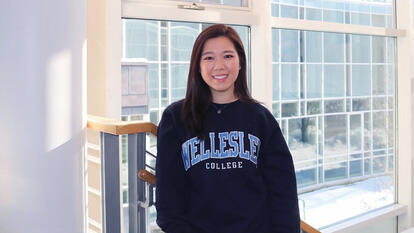
Rangel Fellowship Kickstarts Alumna’s Career in Foreign Service
Kiana Nedele ’16 is earning a master of arts in law and diplomacy at the Tufts Fletcher School of Law and Diplomacy thanks to a Charles B. Rangel International Affairs Fellowship, which she was awarded in 2020. A U.S. State Department program administered by Howard University, the fellowship funds a two-year graduate program in international affairs and two overseas internships with a U.S. embassy or consulate. Fellows learn about U.S. foreign policy and prepare for careers in the U.S. foreign service.
We caught up with Nedele to learn more about her experience with the program.
How did your time at Wellesley shape your interest in foreign affairs?
I’ve been interested in foreign affairs for a long time; I came into Wellesley planning to major in international relations. What I hadn’t planned on specifically was taking Russian, but that’s what really opened doors for me. All the professors in the Russia/Eurasia program are wonderful people, and they encouraged me to study abroad—a full semester in Moscow, and a Wintersession each in Moscow and Tbilisi—and later helped me get work abroad, too. Without those professors I don’t know if I would ever have seriously thought it possible for me to travel, let alone work and communicate, in a foreign culture and language.
What inspired you to pursue a Rangel fellowship?
When I became a senior and started thinking about jobs, the foreign service was at the top of my list. Unfortunately I didn’t get past the second stage of the foreign service application process, and so I mentally shelved the idea and found other work. Two years later I got a job teaching English in Russia, and after a year there I knew I wanted to commit to the international relations field, so graduate school was the natural next step. While researching funding, I found out about the Rangel program, and its combination of funding and foreign service work after graduating was really a dream come true.
How has your experience been so far?
It’s been great, although it’s been very different from the usual fellowship experience due to COVID. I’m currently finishing my first two years in graduate school, and I’m preparing for my overseas internship this summer, which unfortunately will be virtual, just like last summer’s programming.
The Rangel fellowship is a dream come true. I’m able to study what most interests me with a wonderful job waiting for me at the end of it.
Kiana Nedele ’16
Despite the pandemic, the fellowship has given me an extended network of friends in the form of my cohort. Although we’re at many different schools now, our group chat is constantly busy and we’ve had several Zoom meet-ups. Graduate school is hard, and it’s nice to be able to share our experiences with friends who are going through the same struggles. Also, the program administrators and teachers are a wonderful support network as well as a great source of information on all aspects of life and work at the State Department. I am especially grateful that during last spring and summer’s horrific acts of police brutality, the administrators and speakers gave us the support and emotional space we needed and acknowledged our pain instead of sticking to pre-planned lessons or talks. 2020 was a year of great loneliness and fear, and having the Rangel family helped me get through it.
What does receiving the Rangel fellowship mean to you?
The Rangel fellowship is a dream come true. I’m able to study what most interests me with a wonderful job waiting for me at the end of it. I’m really excited about the foreign service, and in the meantime I can develop useful skills and enjoy my classes without trying to navigate the job market at the same time.
Thanks to my time at Wellesley, I already have some regional expertise with Russia/Eurasia, so now I’m studying the broader frameworks that tie together the U.S.’s diplomacy around the world. My graduate studies are focused on expanding my knowledge of the international system within which diplomacy operates, especially treaties/international law and international economics. This summer I’ll be virtually interning in the public diplomacy section in the U.S. Embassy Kigali [the capital of Rwanda], where I’ll see American soft power diplomacy in action and further develop my cross-cultural communication skills.
How have your graduate studies and the fellowship experience shaped your future goals?
My graduate studies have demonstrated to me the importance of considering as many perspectives as possible beyond the state/government level in order to really be useful and effective—that diverse ideas and modes of analysis from a wide spectrum of people(s) is not just good but necessary if we want effective policies that multiple parties will agree to and that properly serve everyone involved. Hopefully I will have a long and successful career as a foreign service officer, and I think that will be impacted by how adaptable and creative I can be.
Final thoughts?
One of the first things said to the fellows at the start of last summer’s programming was “to whom much is given, much is required,” and it reminded me of Wellesley’s motto, Non Ministrari sed Ministrare. The Rangel fellowship is a gift to kickstart a career of service, and I’m very grateful that I get to work on what interests me most in a way that serves others.


